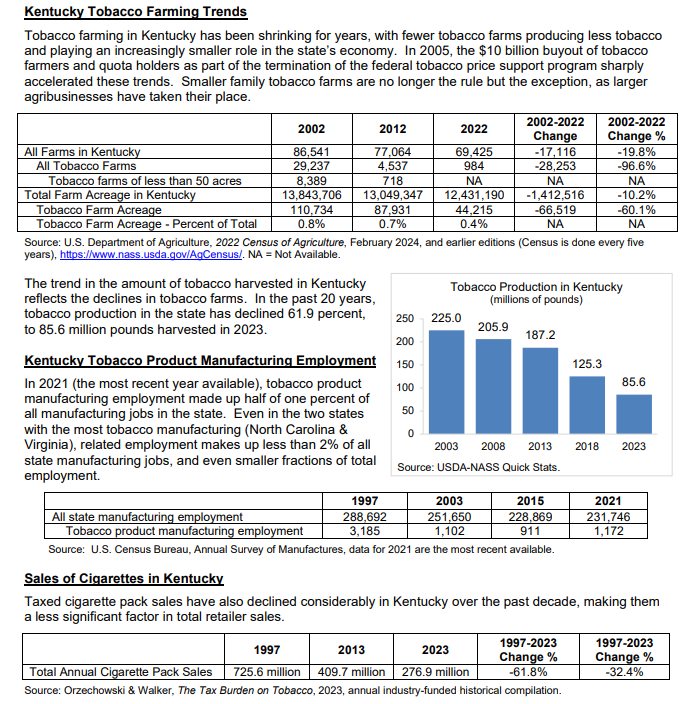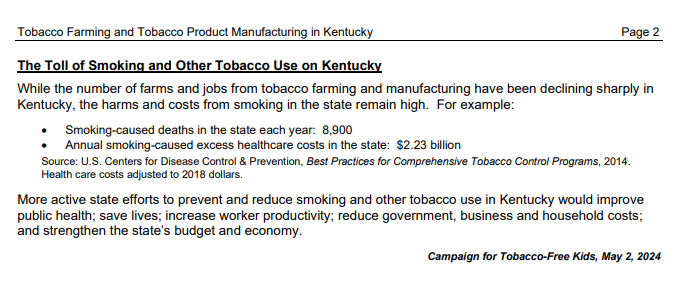Terp Wars: Rise of the Hempire
There are a lot of hurt feelings in the wake of the recent hemp crackdown, and understandably so. Imagine being told that not only do you no longer have a job, you might need to move somewhere else to do it. Brutal.
Hemp, a once docile corner of agriculture has, warped into a $30B industry, and then put on life support just as fast. But where did this infatuation with hemp come from, and how did it go from grandma-approved CBD topicals, to intoxicating hemp?
To understand why hemp became the villain, you have to understand its cancerous older cousin…
A New Plant
Long before hemp, states were dealing with another problem. The tobacco economy was rotting from the inside out. Entire states— North Carolina, Virginia, Tennessee, Georgia, Florida—were built on the stuff, Including Kentucky.
According to USDA-NASS data, tobacco production in Kentucky collapsed from 225 million pounds in 2003 to just 85.6 million pounds in 2023—a 62% plunge. Tobacco farms dropped from 29,237 in 2002 to just 4,537 by 2012. Sales, down by the millions.
This wasn’t a small leak, it was a punctured lung.
“Tobacco Farming and Product Manufacturing in Kentucky” - Campaign for Tabacco-Free Kids, May 2, 2024, .page 1
To top it off, the work force was also declining.
At a 2018 hearing in the Kennedy Caucus Room, Congressman David Scott pointed out how important this hemp bill was,
“The average age of a farmer in this country is 65. We need a way to bring young people back into agriculture.”
Translation: this old crop is dying, and so are the people who grow it.
The challenge is clear; younger generations don’t want to farm, they just want to grow w**d, but we spent the last 50+ years telling people how bad it is for you. So there is no way in heck your getting grandmas vote if you make this stuff legal.
At this point, Insurance companies weren’t helping either—state laws started requiring coverage for tobacco-cessation treatment. Suddenly even the insurers were betting against the old leaf.
“Tobacco Farming and Product Manufacturing in Kentucky” - Campaign for Tabacco-Free Kids, May 2, 2024, .page 2
On paper, hemp looks like a saving grace. Tobacco is slow, labor-heavy, and contract-dependent. And the market is shrinking every year. After labor, curing barns, contracts, and inputs, many farms often break even or lose money. While hemp can be harvested faster, extracted, and faces shorter line times for CPG production including beverages, as they don’t need a 3-6 fermentation period like hops.
The Hempire Strikes Back
By 2019, CBD franchises weren’t just building wellness shops—they were selling positioning. These places weren’t built around tinctures or topicals as the business; they were built around corners, traffic counts, and lease terms. Real estate dressed up like aromatherapy.
They planted themselves in high-visibility locations with low overhead and a pitch for investors as passive income: set up the storefront now, lock in the address, and when federal regulation lands, you’re already standing where the distribution highway touches down.
These operators weren't all herbalists fighting to cure anxiety. Some were early-stage franchise strategists—staking territory.
And in politically conservative states—Texas front and center—these shops multiplied with a kind of fungal enthusiasm. You’d blink, and another one was across from a gas station, across from a gym, across from a grocery store. The map started looking like someone spilled pushpins across it.
By 2023, the shine wore off. The FDA refused to take a stance. Congress kept punting the issue into whatever void bills vanish into. CBD interest and sales dropped. Customers wanted a feeling, not a compromise. And the dream of “passive income” began to look less like a DREAM, and more like a nightmare.
Google Trends 2015-current
Operators felt the walls closing in, and they improvised - “If you won’t regulate us,” they said, “we’ll build our own market.”
Hemp beverages. A parade of synthetics. The alphabet soup hit the shelves faster than regulators could Google the acronyms.
Suddenly grandma’s safe little plant wasn’t so safe anymore. It became a full-blown substitute for regulated intoxicants—cheap, accessible, and completely outside the system built to manage that world. As one Texas shop owner summed it up with a shrug: “It’s easier to talk to grandma about hemp then w**d.”
Attack Of The Clones
By 2024, hemp operators knew what was on the line and the messaging machine roared to life. Advocacy groups appeared almost overnight. Podcasts multiplied. Influencers took up the cause. Political committees formed with names engineered to pull heartstrings. And the slogans felt familiar—eerily familiar:
“Vet-owned.”, “Women-owned.”, “Support the farmers.”, “Protect the patients.”…You would be a fool to argue these points right?
These weren’t accidents. This was borrowed language—the same rhetoric used for years by regulated-market activists, repurposed and redeployed to defend an unregulated, multi-billion-dollar empire built entirely outside the traditional system.
Some groups went even further, flipping the narrative and painting licensed operators as elitist gatekeepers in a game they didn’t choose, and didn’t agree to play.
Now with a ban on the horizon, hemp operators have less than a year to pivot before banks start calling in loans they were happy to float when the money was easy. Supply chains will start to lock up like seized engines. Warehouses stacked to the rafters with product—once worth millions—are now nothing but cardboard and regret.
The stores, the labs, the farms; they won’t be rescued by family operators or local entrepreneurs. They’ll be scooped up at auction by the same corporations that treated hemp like a Trojan Horse—using it to slip into a market they could never fully touch before.
That’s the irony. The empire built to replace a dying crop may now be devoured by the exact forces that nudged it into existence.
And in the middle of the wreckage, you’ll still see the stage sets: Crisp podcast studios. Hempster brands that looks a little too polished. Advocacy pages blooming overnight with familiar slogans - they’re “fighting for you”,.
Just remember. Men Lie. Women Lie. Numbers Don’t.



